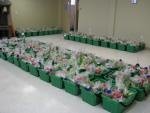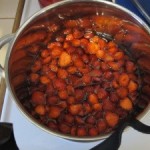No Spray. Artisan. Free-Run. Heirloom. Have you ever wondered what these food-related terms mean and how they are regulated? Well, we’ve got you covered! Our friends at the Greenbelt Farmers’ Market Network (Ontario) have compiled a short guide of food and farming terms that are commonly used to describe agricultural practices and products – we encourage farmers’ market goers to check these out below!
General terms:
Artisan/artisanal
This term is used to describe products made in a traditional or non-mechanized way using high quality ingredients. The term is most frequently used to describe bread, cheese, chocolate, vinegars, jams and jellies. The ingredients are not necessarily grown by the maker of the product.
Conventional
Depending on the farm and what is being produced; conventional farming may include the use of pesticides, synthetic fertilizers, antibiotics, added hormones and other approaches.
Local
Food and other agricultural products produced, processed and sold within the region where they are produced, as defined by distance, provincial or regional boundaries. The Canadian Food Inspection Agency defines “local” as food produced in the province or territory in which it is sold, or food sold across provincial borders within 50 km of the originating province or territory.
Genetically modified
Genetic modification, or genetic engineering, refers to techniques by which the genetic material of an organism is changed in a way that does not occur naturally. In Canada, there is no requirement to label foods that are the product of genetic modification or contain genetically modified ingredients.
Natural
Generally, natural foods are expected to contain no artificial colours, artificial flavours, or preservatives and be minimally processed, however, this term is not regulated. The Canadian Food Inspection Agency uses the following guideline: “foods or ingredients of foods submitted to processes that have significantly altered their chemical, physical, or biological state should not be described as ‘natural’”.
Raw
Used to describe milk, cheeses, cider, vinegar, honey, sauerkraut and other foods that are not pasteurized or otherwise cooked.
Sustainable
Used to describe farming that is economically viable, socially just, humane and/or environmentally sound, however this term is not regulated.
Produce related terms:
Heirloom (also called traditional varieties)
Used to describe seeds developed through years of cultivation, selection, and seed saving, and passed down through generations. Heirloom varieties are generally regarded as having been in existence for a minimum of 50 years.
No-spray/pesticide-free
No pesticides, herbicides, or fungicides have been applied from the time of crop emergence until the time of marketing. Not a regulated term.
Vine-ripened/tree-ripened
This term describes fruit that has been allowed to ripen on the vine or tree. In contrast, fruits that are picked while still unripe and firm to be shipped long distances are later treated with ethylene gas to ‘ripen’ and soften them.
Transitional
A term referring to farmland cultivated using organic practices while transitioning to organic certification. Farmers must practice organic methods for three years on a given piece of land, and undergo inspection during the third year, before certification can take place and the products harvested from that land can be sold as organic.
Meat-related terms:
Free-run, Free-range
Free-run describes conditions in which animals can move freely within a barn, but not necessarily go outside. Free-range means a product comes from an animal raised with access to the outdoors, however practices can vary from farm to farm.
Grass-fed
Grass-fed refers to animals raised for meat (including cattle, sheep, goats, and bison) whose diet consists of only freshly grazed pasture during the growing season and stored grasses during winter months. Not a regulated term.
Grain-fed
Chicken feed is primarily grain, while other animals such as pigs and beef cattle may also be fed grain.
No antibiotics
Some farms administer antibiotics to beef cattle, hogs, sheep or chickens to boost growth rates and reduce the risk of disease in crowded conditions. Other farms use antibiotics only to treat sick animals. Some farms do not use antibiotics under any circumstances.
No added hormones
All animals produce hormones, however added hormones are commonly used in beef production to speed growth. If a producer implants livestock with natural hormones, they may label their products “raised without the use of synthetic hormones”. The use of hormones in the poultry industry has been banned in Canada since the 1960s.
Heritage
Heritage breeds are traditional livestock breeds that were raised by previous generations of farmers. These are the breeds that existed before industrial agriculture became a mainstream practice.
Pastured
A significant portion of the animal’s life is spent outdoors, with access to vegetation and insects, as season and daylight hours permit. Not a regulated term.
Certification systems:
Certified Organic
No synthetic fertilizers, pesticides, herbicides, sewage sludge, irradiation to preserve food, genetically modified organisms or genetically engineered seed/stock can be used in the production of certified organic foods. Certified organic livestock are not subjected to intensive feedlots, antibiotics, medicated feed or added growth hormones. ‘Certified Organic’ assures the consumer that production has met regulated standards, a yearly inspection has been passed and an audit trail has been kept. Regulated term (Canada has national standards that define organic agriculture).
As per the Agriculture and Marketing Act in Nova Scotia, a person may not use a business name that contains the terms organic; organically grown; organically produced; organically raised; or organic grade in connection with a product unless the product meets the requirements for organic grade.
For more information on organic certification in Nova Scotia, click here and here.
Biodynamic
In addition to organic practices including crop rotation and composting, biodynamic farming relies on special plant, animal, and mineral preparations and the rhythmic influences of the sun, moon, planets and stars. Regulated in Canada by Demeter Canada.
Local Food Plus
A Canadian system that certifies food as being locally produced using sustainable farming methods. Click here for more information.
To read the original “What’s in a label” document, click here.
~This is a re-post of Farmers’ Markets of Nova Scotia’s blog. To subscribe to the Farmers’ Markets of Nova Scotia’s newsletter click here.
















